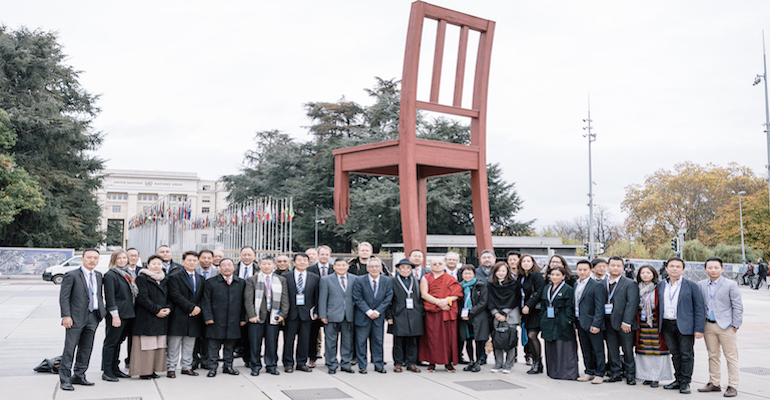China’s crackdown on religious and ethnic minorities was called out by all the major western superpowers at the United Nations Universal Periodic Review (UPR) held in Geneva on November 6-10.
Thirteen countries, including the United States, United Kingdom, Australia, Canada, France, Switzerland and Germany pushed for the abolishment of China’s state-sponsored re-education labour camps where an estimated one million Uyghur and other Muslims are forcefully incarcerated in China’s Xinjiang Uyghur Autonomous Region.

Tibetan Activists and CTA representatives in-front of the Broken Chair, Geneva
Photo: DIIR
The 2018 UPR session was the third peer review of China’s human rights situation, and saw 153 of the 193 UN member nations participate to pose questions and give recommendations to help improve the Asian superpower’s worsening human rights record. The session took place amidst widespread demonstrations, with at least 1,000 human rights activists gathered outside the UN headquarters in protest – Tibetans and Muslims holding Tibetan flags and large banners bearing photographs of activists, journalists and even common citizens who have been abducted or incarcerated by the Chinese government.
In strongly-worded recommendations, the representatives of these powerful first world nations urged China to “immediately release” the thousands of citizens and human rights defenders being held in these internment camps and “black jails”, and to facilitate access to the Tibetan and Uyghur regions for officials from UN bodies and the UN high commissioner, as well as media personnel and diplomats.
“Respect the fundamental rights of ethnic minorities in Xinjiang and Tibet, notably freedom of religion and movement,” said the Swiss representative.

UN Human Rights Council
“Investigate reports of harassment and detention of human rights defenders, including alleged mistreatment while in police custody, with a view to ending impunity,” urged Australia, which submitted 14 recommendations, also calling for the abolishment of the death penalty, transparency in media and greater access for UN delegations. The United States echoed, “End the use of harassment, detention, arrest, and extralegal measures such as enforced disappearance to control and silence human rights activists as well as their family members and friends.” The recommendations of Czechia went as far as to mention names of activists killed or tortured for their dissent— Pema Sepak killed in Chambo, Tashi Tao and Ms Dhungtso arrested for peaceful assembly— and called for investigations into these cases, among others.
Despite the highly relevant statements of censure from these powerful nations, in contrast the South Asian countries, particularly China’s immediate neighbours, were bland and vague in their recommendations. In their statements, Pakistan called for “action against criminals who instigate, intimidate or help others to commit self-immolations” while Sri Lanka recommended that they “continue to counter terrorist and ethnic separatist activities undertaken by certain individuals and groups.”
Even as 45 countries urged China to ratify the International Covenant on Civil and Political Rights (ICCPR), India refrained from mentioning human rights violations and instead called for greater involvement of women in village administration. Bangladesh, Malaysia, Brunei and Indonesia, despite being Muslim countries, did not speak up against China’s mistreatment of Muslims. Japan was the sole Asian voice that called for protection of the cultural rights of China’s minority groups.
Predictably, China denied all allegations of violence and discrimination against ethnic minorities and indulged in a presentation full of self-glorification and fabricated explanations. Insisting that Beijing protects the rights of the 55 minority groups in China, Chinese Vice Foreign Minister Le Yucheng told the council that China’s establishment of “vocational education and training centres” in Xinjiang were part of a “preventive counter-terrorism initiative” aimed at helping to free the minds of people affected by extremism. Referring to the Chinese government’s poverty-alleviation measures and strong Asian values, Le Yechung rejected the global criticism of China’s human rights situation, calling it “politically motivated and an excuse for other nations interference in China’s territorial sovereignty and autonomy”.
The Universal Periodic Review is a process which involves a periodic review of the human rights records of all 193 UN Member States. It is an innovation of the Human Rights Council which is based on equal treatment for all countries. It provides an opportunity for all States to declare what actions they have taken to improve the human rights situations in their countries and to overcome challenges to the enjoyment of human rights. The UPR also includes a sharing of best human rights practices around the globe. Currently, no other mechanism of this kind exists.




 Print
Print Email
Email